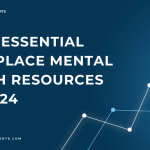Understanding Mental Health in the Workplace
Mental health is increasingly recognized as a critical factor in workplace productivity and employee engagement. In 2024, managers need to prioritize mental health training to foster a supportive work environment. According to the World Health Organization (WHO), mental health issues affect one in four people globally at some point in their lives.
“Investing in mental health is not just about reducing costs; it’s about enhancing productivity and improving quality of life.”
Why is Mental Health Important?
- Employee Well-Being: A mentally healthy workplace supports employees’ overall well-being.
- Productivity Boost: Employees who feel supported are more productive and engaged.
- Reduced Turnover: Companies that prioritize mental health see lower turnover rates.
Resources for Further Reading:
- Mental Health in the Workplace – World Health Organization
- The Business Case for Mental Health – Mind UK
Fostering Open Communication
Creating an atmosphere of open communication is essential for managers aiming to support mental health. Employees should feel safe to discuss their mental health without fear of stigma or repercussions.
Tips for Fostering Communication:
- Regular Check-Ins: Schedule one-on-one meetings to discuss not only performance but also well-being.
- Anonymous Feedback: Use tools like surveys or suggestion boxes to allow employees to voice their concerns anonymously.
- Mental Health Resources: Share resources and contacts for mental health support openly with the team.
“Open communication is the gateway to understanding and support in the workplace.”
Visual Element: Communication Tips Table
| Communication Strategy | Benefits |
|---|---|
| Regular Check-Ins | Builds trust and rapport |
| Anonymous Feedback | Encourages honest dialogue |
| Resource Sharing | Normalizes mental health discussions |
Also look for more insights on the importance of fostering a positive mindset in the workplace in our article on 10 ways positive thinking boosts workplace success.
Recognizing Signs of Mental Health Issues
As a manager, being able to identify signs of mental health issues can be a game-changer. Early intervention can make a significant difference in an employee’s recovery.
Common Signs to Look For:
- Changes in Behavior: Noticeable shifts in a person’s demeanor, such as increased irritability or withdrawal.
- Decline in Performance: A drop in productivity or quality of work can indicate underlying mental health challenges.
- Absenteeism: Frequent absences can often signal distress or mental health issues.
“Awareness is the first step toward change. Recognizing the signs can lead to timely support.”
FAQs
Q: What should I do if I notice signs of mental health issues in my team?
A: Approach the employee in a private setting, express concern without judgment, and encourage them to seek professional help if necessary.
Q: How can I educate myself and my team on recognizing these signs?
A: Consider attending workshops or training sessions focused on mental health awareness. Many organizations offer resources, such as Mental Health First Aid.
You can also learn how to manage stress effectively, which is often linked to mental health issues, by reviewing our techniques at 10 proven stress management techniques for daily relief.
Encouraging a Healthy Work-Life Balance
Promoting a healthy work-life balance is crucial for mental health. Managers play a pivotal role in creating policies that support this balance.
Strategies for Encouraging Balance:
- Flexible Work Hours: Allow employees to adjust their schedules to accommodate personal commitments.
- Encourage Time Off: Promote the importance of taking breaks and utilizing vacation days.
- Lead by Example: Demonstrate a balanced lifestyle by taking time off when needed and respecting others’ time.
“Work-life balance isn’t just a personal goal; it’s a company value that enhances productivity and morale.”
Visual Element: Work-Life Balance Tips Table
| Strategy | Implementation Example |
|---|---|
| Flexible Work Hours | Allow employees to start/finish their day at times that suit them |
| Encourage Time Off | Set reminders for team members to use their vacation days |
| Lead by Example | Share your own experiences of taking breaks and mental health days |
For more strategies on promoting positivity and reducing stress, check out our article on 10 positive thinking techniques to reduce stress.
Implementing Supportive Policies
Supportive policies create a framework for mental health in the workplace. Managers should be proactive in developing guidelines that promote mental wellness.
Key Policies to Consider:
- Mental Health Days: Implement specific days dedicated to mental health to allow employees to recharge.
- Employee Assistance Programs (EAPs): Provide access to confidential counseling and support services for employees.
- Mental Health Training: Offer training for all employees on how to support colleagues facing mental health challenges.
“Policies are the backbone of a supportive culture; they set the standard for behavior and practice within an organization.”
Resources for Policy Development:
- Creating a Mentally Healthy Workplace – Mental Health Foundation
- Workplace Mental Health Policies – CDC
For insights on building resilience in the workplace, which complements supportive policies, explore our article on 10 strategies to foster resilience in the workplace.
In conclusion, as we move into 2024, it is crucial for managers to prioritize mental health training. By understanding mental health, fostering open communication, recognizing signs of distress, encouraging work-life balance, and implementing supportive policies, managers can create a healthier and more productive workplace.
“Emphasizing mental health is not just a trend; it’s a commitment to the well-being of your employees, leading to a thriving organizational culture.”
By investing time and resources into mental health training, managers not only contribute to the welfare of their teams but also enhance the overall success of the organization. Embrace these tips and lead the way to a mentally healthy work environment!





